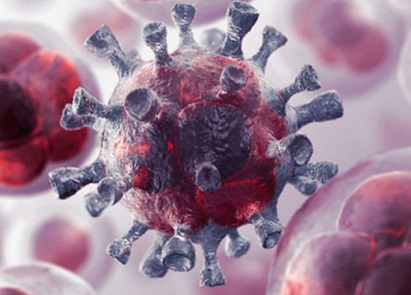Altered Serum Concentrations Of IL-8, IL-10 and IL-32 In Individuals With Lung Impairment 6-Months After COVID-19
Nikhil Prasad Fact checked by:Thailand Medical News Team May 26, 2024 1 year, 9 months, 2 days, 3 hours, 48 minutes ago
COVID-19 News: Understanding Long COVID and Its Implications
As the COVID-19 pandemic recedes, the aftermath of the infection continues to affect millions worldwide. Long COVID, characterized by persistent symptoms months after the initial infection, remains a significant concern. Research from the University of Siena, Italy, delves into this issue, focusing on the inflammatory markers in patients with lung impairments six months post-COVID-19. This study by researchers from the University of Siena, Italy that is covered in this
COVID-19 News report, sheds light on the altered serum concentrations of IL-8, IL-32, and IL-10, providing insights into the prolonged immune response and potential prognostic markers for lung sequelae.
 Altered Serum Concentrations Of IL-8, IL-10 and IL-32 In
Altered Serum Concentrations Of IL-8, IL-10 and IL-32 In
Individuals With Lung Impairment 6 Months After COVID-19
The Persistent Threat of Long COVID
Long COVID, or post-COVID syndrome, manifests in a substantial portion of those infected with SARS-CoV-2. Symptoms can last for months, significantly affecting the quality of life and the ability to work. The World Health Organization defines long COVID as symptoms persisting for at least two months and occurring at least three months after the onset of COVID-19, with no alternative diagnosis.
The pathogenesis of long COVID is still largely unknown, but prolonged inflammation is believed to play a crucial role. This study evaluates the inflammatory and immune-mediated cytokines in individuals with altered high-resolution computed tomography (HRCT) features and those without any long-term COVID symptoms.
Investigating the Immune Response
The study involved 89 adult patients previously hospitalized with COVID-19. Blood samples were collected and analyzed to measure serum concentrations of various cytokines, including IL-4, IL-2, CXCL10 (IP-10), IL-1β, TNF-α, CCL2 (MCP-1), IL-17A, IL-6, IL-10, IFN-γ, IL-12p70, and TGF-β1. Patients were stratified into groups based on HRCT evidence of fibrotic lung alterations.
Key Findings: IL-8, IL-32, and IL-10
Using machine learning approaches, the researchers identified IL-32, IL-8, and IL-10 as significant markers associated with lung sequelae. Patients with lung impairment exhibited increased levels of IL-32 and decreased levels of IL-8 compared to those without lung issues. Additionally, IL-10 levels were lower in patients who had severe COVID-19 during hospitalization.
Implications for Prognosis and Treatment
These findings offer a deeper understanding of the immune response in patients with lung sequelae after COVID-19. The differences in cytokine profiles between patients with and without lung impairments suggest that IL-8, IL-32, and IL-10 could serve as potential prognostic markers. This knowledge is crucial for developing targeted treatments to manage and mitigate long COVID symptoms.
The Role of Cytokine
s in Long COVID
Cytokines, small proteins crucial in cell signaling, play a vital role in the body's immune response. In the context of COVID-19, cytokines like IL-8, IL-32, and IL-10 have been linked to the severity and persistence of symptoms. IL-8, for example, is known for its role in attracting neutrophils to infection sites, while IL-32 is involved in regulating inflammation and apoptosis. IL-10, an anti-inflammatory cytokine, helps regulate immune responses and inflammation.
Clinical Characteristics and Stratification
The study revealed that patients with HRCT evidence of fibrotic abnormalities were generally older and exhibited lower DLCO percentages, though the distribution of comorbidities did not differ significantly. Machine learning analysis helped identify the most accurate predictors of lung sequelae, with IL-32, IL-8, and IL-10 emerging as key markers.
Impact of COVID-19 Severity on Long-Term Outcomes
The severity of the initial COVID-19 infection also influenced long-term outcomes. Patients who experienced severe COVID-19 showed decreased levels of IL-10, suggesting that Treg cells, which release IL-10, might contribute to the prolonged immune dysregulation seen in severe cases. This finding underscores the complex relationship between acute infection severity and long-term health effects.
Correlation Analysis and Immune Profiles
The study also explored correlations between cytokine levels and pulmonary function tests. IL-32 showed indirect correlations with FEV1 and FVC percentages, while IL-6 inversely correlated with DLCO. These correlations highlight the intricate interactions between cytokines and lung function, emphasizing the need for comprehensive monitoring of inflammatory markers in long COVID patients.
Discussion and Future Directions
The findings from this study highlight the significant healthcare burden posed by long COVID. The persistent symptoms and potential for long-term lung damage call for ongoing research into the underlying mechanisms and potential treatments. Understanding the role of cytokines like IL-8, IL-32, and IL-10 in the immune response provides valuable insights into the pathogenesis of long COVID and offers a foundation for developing effective therapeutic strategies.
Conclusion
As the world continues to grapple with the aftermath of the COVID-19 pandemic, studies like this one from the University of Siena are crucial for unraveling the complexities of long COVID. By identifying key inflammatory markers associated with lung sequelae, researchers are paving the way for better diagnostic tools and targeted treatments to improve the lives of those affected by this enduring condition.
The study findings were published in the peer reviewed journal: Immunobiology.
https://www.sciencedirect.com/science/article/pii/S0171298524000317
For the latest
COVID-19 News, keep on logging to Thailand Medical News.
Read Also:
https://www.thailandmedical.news/news/covid-19-news-researchers-uncover-that-interleukin-6-is-associated-with-heart-failure-in-sars-cov-2-infected-individuals
https://www.thailandmedical.news/news/indian-researchers-find-that-interleukin-9-il-9-worsens-covid-19-infections-and-airway-inflammation
